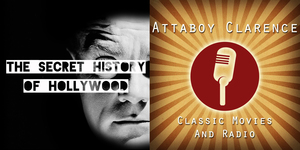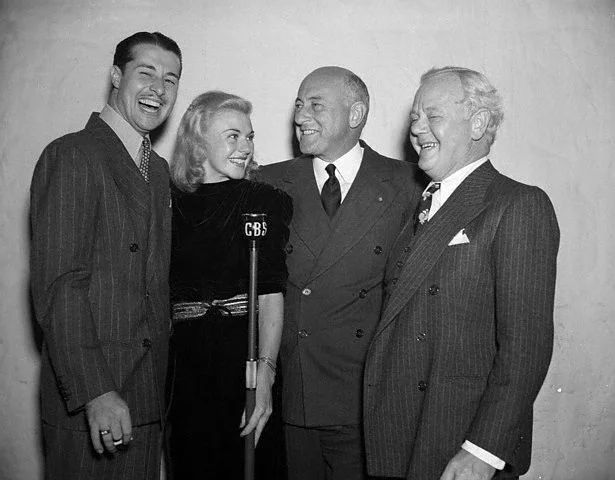For prestige, there was no greater radio show than the Lux Radio Theatre. Running from 1934 to 1955, it was a cultural phenomenon, starring the finest of Hollywood's elite players in adaptations of popular movies.
Created by the J. Walter Thompson Advertising Agency, and sponsored by Lever Brothers, "the makers of Lux soap", the show followed a fairly straightforward structure. The host entered after the overture and introduced the evening's production and stars, gently commenting on the efficacy of Lux soap, as well as mentioning its popularity among Hollywood's loveliest ladies. The radio play itself would usually be broken into three acts, with short commercials for Lux between all segments. Once the play was finished, the host would chat to the stars, again nudging them to say wonderful things about Lux, which would be dutifully read from a script by the star. The host would then tell the audience about the following week's production, as well as who was scheduled to star, which generally produced audible gasps of delight from the assembled audience.
The first broadcast began at 2:30pm on Sunday, October 13th, 1934. The production was 'Seventh Heaven' and starred Miriam Hopkins, a huge star at the time. 'Seventh Heaven' itself already had quite a Hollywood pedigree. It began as a successful Broadway play that ran for 704 performances between 1922 and 1924, before being adapted into a silent movie in 1927. This version had been among the first three films nominated for Best Picture at the newly created Academy Awards (then called "Outstanding Picture") alongside 'The Racket' and 'Wings', the latter of which went on to claim the prize.
It was hosted by Douglass Garrick, a fictional producer played by John Anthony in the first season, and Albert Hayes in the second. The entire first and second seasons were made up of stage hits featuring such stars as Leslie Howard, Ethel Barrymore and Paul Muni, but despite being a critical success, Lever Brothers wanted higher listening figures for their dollar. Changing to a coveted Monday 9pm slot did little to affect the figures, so the show decided to move from New York City to Hollywood, and to focus on adapting the public's favourite movies instead of revered Broadway hits.
America, and indeed the world, was movie crazy. Going to the movies wasn't the two-hour, wallet-busting experience it is today. It was cheap, and you got bang for your buck. An evening at the cinema was a lengthy experience, usually consisting of one or more live acts, followed by a cartoon. Then came a live-action comedy short, such as a Three Stooges or Laurel and Hardy short, a novelty short (usually a travelogue or musical performance), a newsreel, and then finally the movie. Sometimes you'd get two movies; a B-movie, generally a 60-70 minute thriller, followed by the more prestigious A-movie.
The problem for the audience of the day, was that once your local movie theatre stopped showing a film, it usually disappeared for good. The only way you could re-watch a movie you liked once it was gone, was if the studio decided to re-release it, which only tended to happen if the movie had been a searing success.
The Lux Radio Theatre was a perfect solution if you were a movie fan. Suddenly the movies you loved on the screen were being broadcast to your home, and these weren't cheap versions. They featured the actors you remembered from the screen performing scripts that had been trimmed down to the muscle to fit inside a one-hour radio broadcast.
Cecil B. DeMille
It was also the perfect solution if you were a movie studio. The Lux Radio Theatre was not only used to broadcast old movies, but to advertise new ones, and to keep their contracted stars in the public eye during downtime. It was a win win.
Lever Brothers weren't done yet. They wanted the show to be a first-rate, cultural experience, akin to the finest Hollywood productions, so they hired the most prestigious, and possibly the most famous Hollywood director of the day, Cecil B. DeMille to be the new host. He was announced as the show's new producer, although his actual duties were simply to present the show as a product of Hollywood itself, as something that even Cecil B. DeMille endorsed.
The first show was an adaptation of the movie 'Morocco', retitled 'The Legionnaire and the Lady', and starred Marlene Dietrich and Clark Gable. Gable was the most popular actor in Hollywood at the time; his box office draw second only to Shirley Temple. The show cost a total of $17,000, a cost of about $300 a minute. Of these costs, DeMille was paid $2,000, and Dietrich and Gable received $5,000 and $3,500 respectively. The average annual U.S. salary at the time was about $1,327. Despite the enormous expense, and the hassle of relocating production to Hollywood, the plan worked.
The show rocketed into the Top 10 most listened to radio shows in the country, and pretty much stayed there for its entire two decade run. For the first time, a live studio audience was admitted, causing a frenzied demand for tickets from rabid movie fans who wanted to see their idols in the flesh. Lux soap sales went through the roof. Audiences all around the country set time aside each week to enjoy their favourite screen stories on the air with their families.
Stars could expect to receive around $5000 for an appearance, and they did their best to always secure the services of the original stars of the movie. Everyone appeared at some point.
Gary Cooper and Jean Arthur re-teamed for 'Mr Deeds Goes To Town'. Humphrey Bogart and Ingrid Bergman came back for 'Casablana'. James Cagney and Pat O'Brien repeated 'Angels With Dirty Faces'. James Stewart acted in an adapted hour-long version of 'It's A Wonderful Life'. William Powell and Myrna Loy appeared in two adaptations of Thin Man movies. It even produced radio adaptations of Disney's 'Snow White' and 'Pinocchio'.
The broadcast on January 9th, 1950 was 'Sorry, Wrong Number', and featured a performance so fierce from its star, Barbara Stanwyck, that she temporarily lost her voice following the play, and couldn't read her scripted advertisement for Lux soap.
The broadcast of 'Captain Blood' on February 22nd, 1937 included not two original stars, but four; Errol Flynn, Olivia de Havailland, Basil Rathbone and Henry Stephenson. DeMille was absent for the broadcast (he was directing 'The Buccaneer'), and so began a tradition whereby guest stars would step in and "produce". Herbert Marshall, who had himself starred in a Lux adaptation of the Academy Award winning 'Cavalcade' only two months earlier, stepped in for DeMille that evening. Future guest producers would include Edward Arnold, Leslie Howard, and Lionel Barrymore, amongst others.
The Lux Radio Theatre reigned without a hitch for eight years until 1945, when a union dispute between DeMille and the American Federation of Radio Artists led to his being barred from radio work. A new host, director William Keighley, was appointed, but his name did not carry with it the prestige accorded to DeMille by the public. Keighley retired from the show in 1952, and was replaced by another director, Irving Cummings, but ratings were in decline, and Lever Brothers were more interested in launching The Lux Video theatre for television than they were in continuing their support for radio.
In 1954, NBC tried in vain to resurrect the show to its former glories by promising "twenty of the greatest Hollywood pictures" between 1954 and 1955, but the popularity of television as a medium and the breakdown of the studio system spelled the end not only for the Lux Radio Theatre, but for the golden age of radio itself. The slide was irreversible.
The Lux Radio Theatre's final broadcast was on June 7th, 1955. The production was 'Edward, My Son' starring Walter Pidgeon. The Lux Video Theatre continued to run until 1957, but never matched the success of its radio counterpart.
In total, 926 episodes of the Lux Radio Theatre were made. It has been estimated that Lux had used 52,000 pages of scripts, 496 stars, 1,467 supporting actors, 18,667 musical cues and 22,667 sound effects. It was, and is, the high watermark for the golden age of radio. No other show came close to the stature afforded to Lux. Indeed, in 1938, DeMille stated "I wouldn't take a million dollars for the experience I've had in radio".
Luckily for us, the Lux Radio Theatre has been preserved by careful hands, and now resides at the Internet Archive, where it can be downloaded and enjoyed by subsequent generations. If you're a fan of classic movies, the spoken word, the stars of yesterday, or simply movies in general, you'd be silly not to avail yourself of these treasures.
There's nothing more perfect for a commute to work than listening to Cary Grant, Katharine Hepburn, James Stewart and Ruth Hussey appearing in 'The Philadelphia Story'. I find that Joan Fontaine and Nigel Bruce appearing in Alfred Hitchcock's 'Suspicion' is an excellent accompaniment to cooking dinner. Humphrey Bogart and Lauren Bacall in 'To Have and Have Not' is perfect for walking the dog. Laurence Olivier and Vivien Leigh performing 'Rebecca' is great bedtime listening.
These hundreds of hours of entertainment are free. It's my privilege to be able to point you to their whereabouts. It's your good fortune to be able to treasure and share them.
Download The Lux Radio Theatre here
(For further reading, you can't really beat John Dunning's excellent 'On The Air: The Encyclopedia of Old Time Radio' which you can find at the link below)






